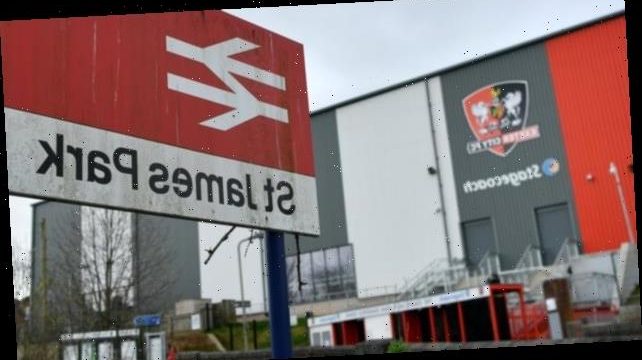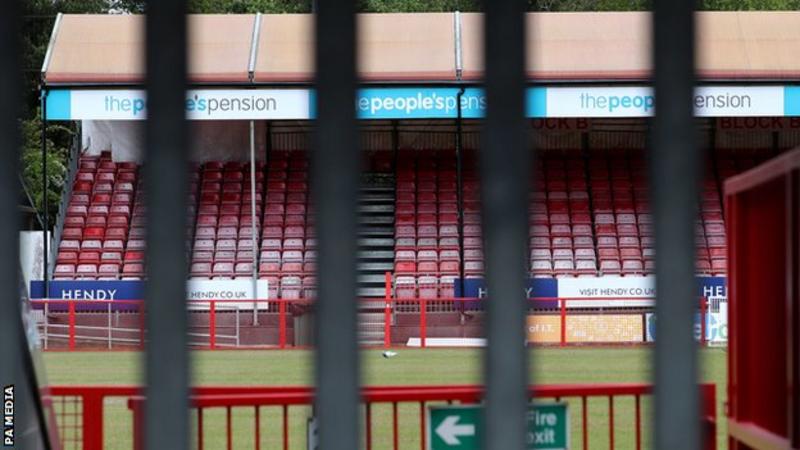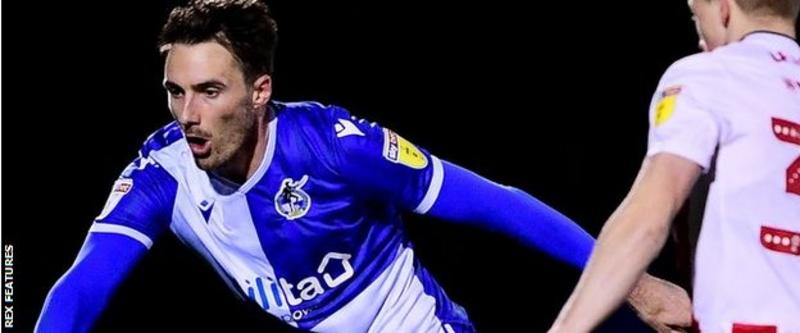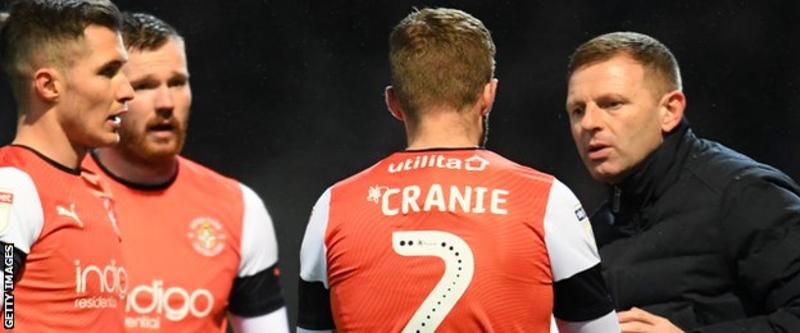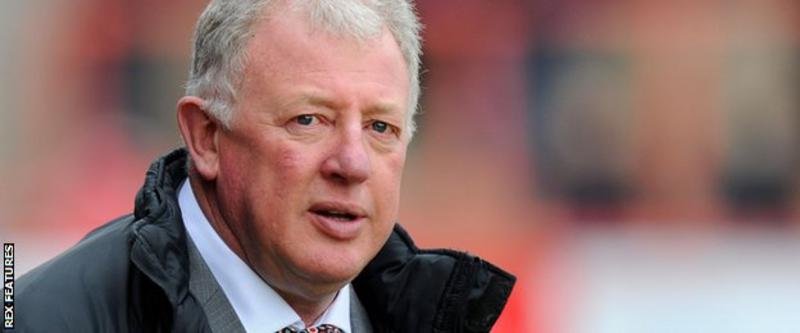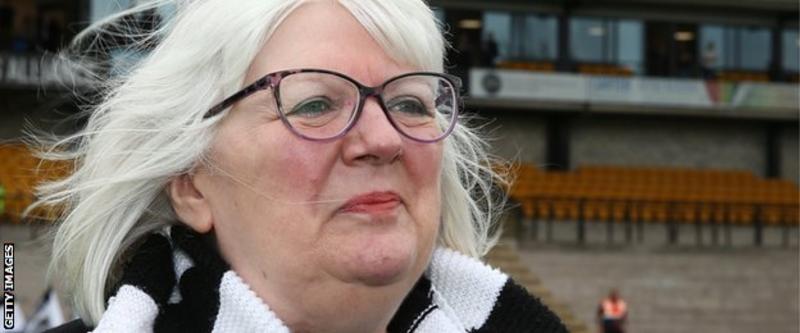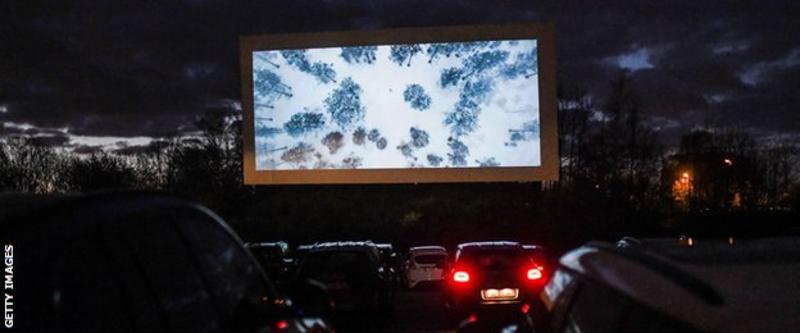This bank holiday weekend was supposed to bring the FA Cup and Championship play-off finals – arguably the most renowned and richest games in club football.
Instead there is a void.
While those at the top of the football food chain may be able to ride out the financial effects of the coronavirus pandemic, clubs and players down the English Football League and below are preparing for seismic changes to both the sport and the livelihoods of those who rely on it.
BBC Sport has spoken to people running those clubs, as well as players, supporters and finance experts about what having no fans at games could mean over the coming weeks, months, and even years.
We will be running a live page on the website from 10:00 BST on Friday to bring you more reaction on how lower league clubs are trying to survive.
Players ‘living paycheque to paycheque’
The problem is clear but the solution is anything but.
Around 1,400 players across the EFL are out of contract at the end of June and there is an ever-growing possibility that fans will not be allowed to attend matches until next year – starving clubs of, what is for many, their main income source.
“I can’t see clubs offering contracts in that period,” said Alex Rodman, midfielder at League One side Bristol Rovers.
He told BBC Radio 5 Live: “A lot [of the 1,400 players] could be lost to the game, which would be a massive shame.
“It’s a horrible situation for them to be in – to think that they need to go and possibly find another job that they maybe haven’t known for the last six, eight or 10 years just to support their families – but it is unprecedented times and I’m sure there’s many other people in the country who are in the same position.”
Rodman’s concerns are echoed by Dr Rob Wilson, sports finance expert at Sheffield Hallam University, who believes “a lot of players” will drop out of football.
“We will naturally see smaller squad sizes and more use of the loan system, particularly by lower league clubs,” Wilson told BBC Sport.
He thinks that will “help redistribute playing talent” but foresees a “depression” in the transfer market.
“Even if clubs are able to pay big fees, the public perception will be so poor that they will try to avoid it,” he added.
“That will naturally depress the total value of the transfer market, and clubs should use this to their advantage in player contract negotiations so anybody looking at contract renewals will probably look at lighter contracts.”
- EFL to keep promotion and relegation
When many think of professional football in England, attention turns straight to the Premier League, where players earn an average of more than £3m a year.
This perhaps creates a feeling that footballers are immune to the financial implications of coronavirus. But Rodman – who is Rovers’ representative of the Professional Footballers’ Association trade union – paints a very different picture in the third and fourth tiers.
“A lot of the players at Bristol Rovers have mentioned to me you’re potentially caught between a proverbial rock and a hard place, in a moral dilemma of do you go back because financially you need to support your family and pay your mortgage or do you stay at home because you need to protect your family’s health and welfare?
“Players, especially at League One and League Two level, probably do rely on a paycheque every month – living paycheque to paycheque – and could not absorb missing one, two, three or four paycheques. I don’t think that could happen.”
Curtis Davies,Darren Pratley and Adam Clayton are among the Championship players to have expressed health and safety concerns over returning to action, while in the Premier League Troy Deeney and N’Golo Kante have opted to miss training over coronavirus fears.
The EFL has already proposed salary caps for teams in the third and fourth tiers from next season, while clubs could be given a vote on the introduction of maximum 20-man squads.
Mansfield midfielder Neal Bishop is one of those who is being let go by his club this summer.
At 38 – and with an offer on the table to remain in football – he acknowledges many players have it harder than him, but is matter-of-fact about what the pandemic is likely to mean for his peers.
“I’m probably relieved I’m at this stage of my career now rather than the beginning or middle because I just can’t see the money being around,” he told BBC East Midlands Today.
“This summer it’s going to be a case of ‘we want you but there’s your offer, take it or leave it’ – there’s going to be 10 or 11 players in the same position as you, willing to take less money just to secure a place at a League One or League Two side.
“I hate to be so pessimistic, I just think, realistically, football is going to change for a very, very long time below the Championship.”
Pandemic ‘more grave’ than administration
It has been more than 10 weeks since a ball has been kicked in League One or League Two.
As two divisions that rely heavily on matchday revenues, that equates to least 73 financially barren days.
In the Premier League, billions of pounds in TV income is at stake if there is no resumption in the foreseeable future, and while they can survive with behind-closed-doors matches beamed worldwide, it is bums on seats that lower league clubs need.
For relegation-threatened Championship side Luton Town, a club familiar with dire financial troubles having gone into administration three times between 1999 and 2007, the crisis is the worst they have faced.
Manager Graeme Jones parted company with the Hatters – a club staring at an immediate return to League One – in April, becoming the first manager in the EFL to leave his job as a cost-cutting measure during the pandemic.
“It’s more grave now than it was back then,” said Luton chief executive Gary Sweet when comparing the impact of the pandemic to administration in 2002 and further financial issues in the 2007-08 season.
“Football can’t survive going a year without supporters – this is a problem and a challenge for the game, not just for Luton Town.
“If you go back to those two periods – at the end of the day if we weren’t there back then somebody would’ve bought the club.
“Right now there’s not really a queue of people willing to buy football clubs.”
Finance expert Dr Wilson says the pandemic “is the single biggest ever challenge to professional football in this country”.
With Bury expelled from League One because of financial problems last summer, Bolton narrowly avoiding liquidation at the same time and a number of clubs failing to pay wages on time or facing winding-up petitions in the High Court during the season, economic issues in the lower leagues have only been magnified by the coronavirus outbreak.
“While we can’t control what we are living though it has absolutely shone the light on the fragility of football’s finances,” Wilson said.
“I keep getting asked the same question – why are things so bad and how did it get to this stage? The truth is, it has been that bad for 10 years.
“The hand-to-mouth existence of clubs can’t happen when the hand to feed them has been cut off.”
Fan-owned Exeter helped by academy sales
With no fans on the terraces, League Two clubs last week united in voting to have the season ended.
Exeter are fourth in the table and are now set to feature in the play-offs for the final promotion spot.
It will cost the club around £400,000, as players and staff are brought off the government’s furlough scheme and testing for coronavirus needs to be covered.
But the Grecians can afford to play on.
They have the prudence of the fans’ trust, which owns the club following its near financial collapse in 2003, to thank.
“It took 10 or 15 years of struggling to get it into a much stronger financial position,” Exeter chairman Julian Tagg told BBC Sport. “Certainly it is way stronger than it ever was at the outset when the trust took over ownership.
“They have been very circumspect about how money should be spent, getting value for that money and taking care because there is no back up.
“The truth is, everyone is going to suffer, including us. It is very difficult but perhaps we have been better placed to help ourselves as best we can.
“I know there are a number of clubs that have struggled to pay wages prior to this event rather than during it.
“My surprise is that someone hasn’t already gone to the wall. There are clubs closer to the wind than you would think across the board.”
Exeter’s academy, which in recent years has produced Ethan Ampadu, Ollie Watkins and Matt Grimes, and subsequently made the club millions following their transfers, has helped the Devon side build up cash reserves.
“The academy has been a major part of that, it’s something we have worked extremely hard at,” said Tagg. “The temptation when we have had some good paydays and windfalls is to plough it straight back in immediately and we haven’t done that. We’ve tried to be circumspect with the amounts that we put back in and the amounts that we hold back.
“No-one envisioned this. Again it will hurt us long term because how will you replace it? It is just reserves that are used up.
“It will make life particularly difficult for every football club.”
The League One deadlock
While Exeter take pride in having a bottom line which is now keeping them afloat, they are also a side with ambition.
Playing out the season is something they could have afforded, but seeing the campaign curtailed and a potential automatic promotion spot go begging is not something Tagg decries – not with the very future of other clubs at stake.
“It wasn’t right to push to continue the season, even if we thought we could finish in the automatic spots,” Tagg said.
“Unity of the league is very difficult because you have some very entrepreneurial people with very fixed determined objectives, so for them to agree unanimously at the time was excellent.
“Football is a tough game – there are some tough individuals in there that have put in some small fortunes. I might have devoted a third of my life to the club, but I haven’t devoted the same kind of finances as some of these people.
“Thinking of football as a whole and not as individual clubs was a very poignant moment and important one.”
In League One, however, the debate of how to finish the season continues to rage, with teams split over a resolution.
Burton Albion chairman Ben Robinson, whose side are 12th with nine games still to play, said the vote by the sides in the division below was “incredible”.
In the week that long-serving manager Nigel Clough left the club because of the financial pinch of the pandemic, Robinson said their very existence is being risked by trying to play on this season.
“I don’t want us to play nine games and fork out £140,000 [for testing] when we’re having to pay our overheads over the coming months when not knowing when next season’s going to start,” Robinson told BBC Radio 5 live.
“And more pertinently when it does start, are we going to get revenue from the fans and our season ticket holders?
“Financially, it’s suicidal.
“To me, there’s only one option which is to void the season now I know the impact of how much it’s going to cost us to repay, around £100,000, under the TV deal.”
- Clough departure saved jobs at Burton
- Dons ask fans to waive ticket refunds
League One talks last week stalled after at least six clubs in the third tier, including Sunderland, Portsmouth and Ipswich Town, said they wanted to continue the season.
Robinson refers to clubs with “vested interests”, while finance expert Dr Wilson calls it “self-interest”.
“It will threaten the final operations at a number of clubs in that division, no doubt whatsoever,” Wilson said of playing out the season in the third tier.
“They will hardly be able to afford to test their players for coronavirus, let alone pay their wages.
“It is all well and good having a couple of big teams trying to dictate what should happen when in reality they have 23 teams that they need to look out for.”
Fans’ money ‘keeping us going’
When clubs in League Two last week agreed to end the regular season campaign, refunding fans for games that would never take place was a financial drain that needed to be faced.
But clubs, including fan-owned Exeter, are finding that some supporters are happy to see money they have spent now put towards getting their teams through the economic fallout of the pandemic.
“A number have already said they don’t want their money back, saying they want to see it used to help the club,” Exeter chairman Tagg said.
“We have also had a good uptake on season ticket holders under exactly the same auspices.
“There are those who can help in such a way, but we have also been very careful and made sure that we don’t have people doing this in a way that causes them any hardship.
“Those who are happy to do it, then that is great because it is very helpful and very useful for a club that is not bringing in any income.
“Everyone has great fans, everyone is a family club but this is very different because they do own it and they do feel a responsibility.”
- ‘Swindon face administration over blocked sale’
- Northampton give up play-off bonuses
At League Two rivals Port Vale, football’s hibernation and the likelihood that a large portion of the 2020-21 season will be played behind closed doors has not stopped people from buying season tickets for next term.
Around 200 have been purchased since lockdown began, taking the total past 900.
Malcolm Hirst, of the Port Vale Supporters’ Club, said renewing his seat was “a way of thanking” owners Carol and Kevin Shanahan, who took over from Norman Smurthwaite – an owner that threatened to put the club into administration in 2019.
“We owe a debt of gratitude to Carol and Kevin for how they have come in, transformed the club and given us hope,” Hirst said.
“I don’t think we had any semblance of hope for the future of this club for over a decade. We are willing to put our trust in them, even in such a short period of time they have earned it.
“The fact they are supporting the club with their own money through this period as well, it is a sense of standing with them and showing them that the fans are grateful.”
Hirst said work being done by the club and owners during the public health crisis by providing thousands of food parcels for vulnerable families has resonated strongly with fans.
“If you can build a positive ethos around a club, fans will buy in,” Hirst said. “It’s just fantastic to see the club I’ve supported after 45 years or so doing its bit and helping.”
For Luton, a club that won back-to-back promotions to reach the second tier for the first time in 12 years, the uptake of season tickets is helping keep them afloat.
“We’re in a very precarious situation and if it wasn’t for our supporters, executive members and sponsors who have stuck by us in this time, it would be much more precarious,” CEO Sweet told BBC Three Counties Radio.
“It’s those guys keeping us going at the moment, who are still willing to buy season tickets and executive packages for next season.
“It’s all of those people who matter so much to us because ultimately it’s their club and the fact that we own it is irrelevant, actually.
“They’re not able to enjoy it [at the moment], yet they’re still giving us their money in tough times and without that it would be a really difficult position.”
What is the way out for clubs?
It started with wage cuts and deferrals, and a heavy uptake of the government’s job retention scheme – which has been leaned on to pay players, as well as non-playing staff.
But as the longer-term repercussions of the pandemic have been laid bare, clubs lower down the pyramid are trying to be proactive and think up innovative ways to keep up some level of cashflow.
Even EFL chairman Rick Parry has conceded that the EFL needed a “proper reset post-Covid”, with clubs currently “stacking up creditors”.
While using stadiums as wedding venues, or for conferences and concerts are the sorts of non-football activities that has generated money in the past, social distancing means even restoring that income will take time.
Tifosy, a sports investment company founded by former Chelsea and Italy striker Gianluca Vialli and former investment banker Fausto Zanetton, have previously helped clubs, including Norwich and Portsmouth raise money, and earlier this season oversaw the part sale of Stevenage.
While prosperous times have made way for a pandemic, Zanetton says the company is still set up to help clubs generate funds.
“The whole business model of football and sport in general is dependent on games being played,” said Zanetton, whose company also offers advisory services to clubs.
“But you have this fixed cost base [player wages] that is extremely high, so whatever disruption happens to your top line you are going to be naked. It is very difficult to hedge against that.
“On the capital raise side of the business our platform can enable clubs to raise money from investors who are fans of the club or close to the club globally.
“I think capital markets, banks, will come out of this crisis and not be very motivated to lend money to football clubs – they already weren’t jumping up and down to do this before.”
Thirty clubs – from League Two Plymouth Argyle to eighth-tier side Frome – have brought forward availability of ticket packages and various matchday experiences for next season, raising money through crowdfunding to pay the bills.
In all, fans have stumped up £300,000 via this method, with some clubs giving a slice of the money to charitable causes.
Last week England captain Harry Kane was given clearance by the FA, EFL and Premier League to sponsor the shirts of Leyton Orient, where he made his senior debut in 2011, next season, donating the advertising space to good causes.
The move could open the door for other high-profile players to follow suit in the coming months, showing support for a lower league club close to their hearts during a time when companies may not be so willing to commit to shirt sponsorship deals.
Orient fans have also donated £40,000 to the League Two club to keep them going.
But arguably the most creative idea for raising income involves eighth-tier Daventry Town, of the Southern League Division One Central.
The Northamptonshire side will show new and classic films using a 9m x 7m screen on their pitch.
People will watch the films from their cars, with sound coming through their radio, and money raised used to support the club’s youth and adult sides.
“We’re repurposing their ground to allow for this to happen,” Ian Marriott, who runs Drive In Films, told BBC Radio Northampton.
“We’re working very hard with the groundsman – it’s been a challenge to persuade them but it’s in the middle of summer.
“It makes good use of their facilities and their bills aren’t stopping.”
Source: Read Full Article
